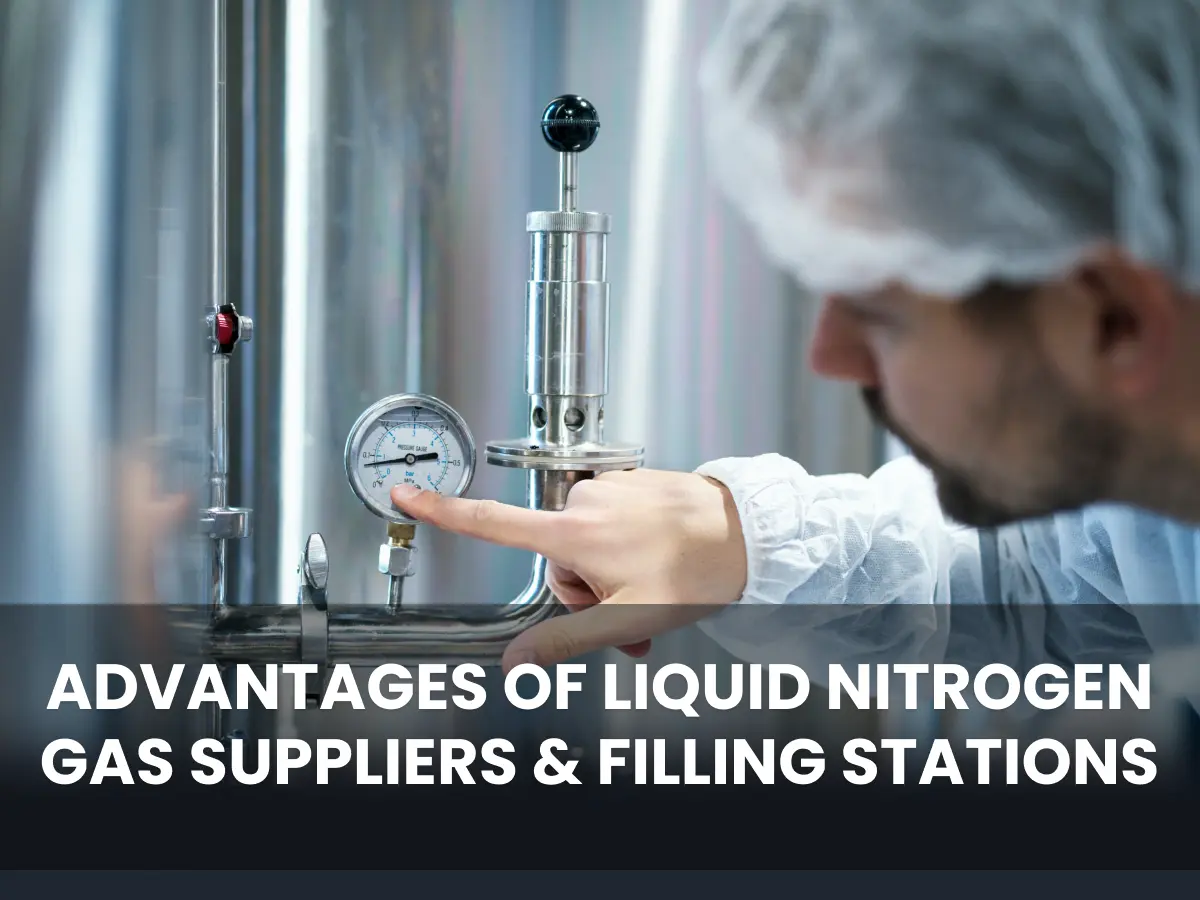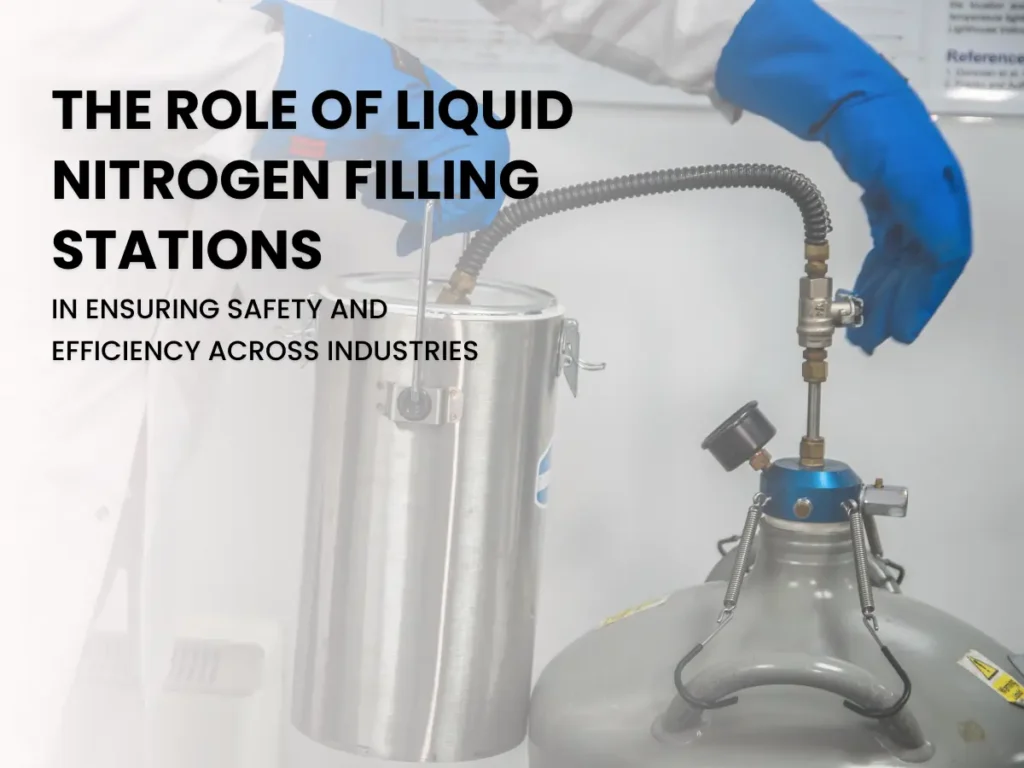The liquid nitrogen is represented by the symbol N in chemistry. This is nitrogen that has changed into a liquid at the low temperature of -195.8° C. In the industrial production process, liquid nitrogen is produced by liquefying air, which consists of 21% oxygen, 78% nitrogen, and a small contribution of other gases. A strong compression is applied to the air, and then it is allowed to cool to a very low temperature. In this process, about 700 liters of air turns into one liter of liquid nitrogen. A kind of dewar flask stores liquid gas.
The liquid nitrogen gas has a wide range of applications in various industries, including medical, food and beverages, manufacturing, pharmaceutical, chemical, and construction. It is a low-temperature gas that freezes items in seconds, thereby saving time. Many restaurants use it to enhance the presentation of their dishes by creating a sense of fog. It is also utilized in making ice cream and for packaging. The liquid nitrogen is provided by liquid nitrogen filling stations, which are responsible for supplying safe and secure small and large-scale quantities according to the needs of businesses.
Medical gas filling services provide support to critical patients with serious issues and help diagnose their main problems. The lungs and heart are sensitive parts of the body, and they require medical gas for external assistance.
Role of a liquid nitrogen filling station for various industries
A cryogenic fluid form of nitrogen is known as liquid nitrogen, which requires extremely low temperatures. This gas is essential for every industry. Hospitals, pharmaceutical laboratories, universities, research sites, and many other organizations and individuals utilize this liquid nitrogen for various purposes. Liquid nitrogen filling station can be found at key locations to serve the needs of these industries. The filling stations previously provided smaller quantities to different locations within the buildings. These stations are connected to central tanks and fill containers for the workstations.
Advantages of Liquid Nitrogen Gas Suppliers & Filling Stations

The filling stations store nitrogen in liquid form, which is produced from air-containing molecules and oxygen. Liquid nitrogen is utilized for chemical reactions and converts substances into useful compounds.
The nitrogen filling stations safely serve all types of industries. There are several benefits to these filling stations:
Speed
The filling stations have many benefits, and one of the major ones is that they possess all the necessary equipment, such as a built-in phase separator that separates the liquid and gaseous forms of nitrogen. The gaseous nitrogen is released naturally by its means, and the filling stations are left with 100% liquid nitrogen gas at a good speed.
The liquid nitrogen has a density, so after the exit of light nitrogen, it is possible to refill the containers with liquid nitrogen to its fullest capacity.
Regulation of pressure
The dewars are flasks with double walls to keep the nitrogen gas at a very low temperature; these vacuum flasks are easy to transport. There are two main types of these dewars: one is open non-pressurised, while the other one is closed dewars for pressure. The pressure dewars are easy to store and transport. The filling station allows customers to set the pressure of their choice according to their requirements.
Safety with automated filing process
As the filling stations are equipped with modern systems, they have smart sensors. These sensors work automatically; when a dewar is filled with liquid nitrogen gas, they immediately stop the system to prevent leakage and any danger. These filling stations have many kinds of sensors to detect any problems and solve them in real-time. That’s why they serve a wide range of industries safely.
Safety Measures
The liquid nitrogen requires safe handling during refilling or transportation because it can cause severe burns if someone touches it accidentally, while its gaseous form displaces oxygen from the area. Without a proper ventilation system, an excess of nitrogen gas can cause shortness of breath. The filling stations are designed with many safety measures, as many people come there for the nitrogen gas supply. Any small chance of leakage or other carelessness can lead to dangers on a larger scale.
The professional and well-maintained filling stations keep an oxygen detector at the location to check if the oxygen level in the air is sufficient. These detectors indicate if the nitrogen is refilling properly in the liquid nitrogen gas cylinder or experiencing any leakage. If they have an automated system, they immediately close the valve to mitigate the danger.
Monitoring
A good filling station must have a card system with a proper monitoring function for the station. In the card system, the users scan a card for extracting liquid nitrogen that can track how much and when someone uses the nitrogen.
This monitoring function helps identify the use of nitrogen gas and assists in collecting costs related to nitrogen from industries as well as individuals.
Maintenance and hygiene
The filling stations ensure the maintenance and hygiene of the gas filling area. While the stations may vary in size and shape, they all prioritize maintenance and cleaning. They have installed vacuums in the pipes, phase separators, control boxes, and valves that keep the place safe from ice formation, bacterial growth, and condemned formulation. These steps are beneficial, especially for the food and pharmaceutical industries.
The role of nitrogen refilling in Lebanon’s industries flow
Professional refilling stations offer reliable liquid nitrogen refill services in Lebanon to meet the needs of various important industries. Each sector has its unique demands; for instance, the food industry requires pure gas to keep food fresh, while the healthcare department needs sterile liquid nitrogen for cryogenics. All sectors and individuals choose a dependable liquid nitrogen gas supplier for safety and secure transportation. Only professional suppliers ensure careful refilling and prevent any leakage and damage.
Professional suppliers prioritize not only the security of the customers but also care for their reputation in the refilling industry. These filling stations provide healthcare with a secure supply of nitrogen gas and contribute economically to the benefit of the country.

